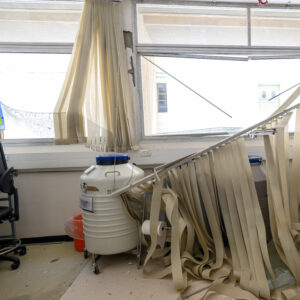
Missiles Attacks Won’t Stop BGU or Israel’s Tech Leadership
Missiles Attacks Won’t Stop BGU or Israel’s Tech Leadership
July 23, 2025
Calcalist—The missile strikes on Ben-Gurion University of the Negev (BGU) and other institutions go beyond damage to infrastructure and research. They seek to undermine Israel’s scientific-technological and strategic backbone.
The extensive Iranian indiscriminate attacks against Israel targeted not only military sites, nor just populated cities or critical infrastructure, but also the country’s “soft power”: scientific research and technology. Among others, ballistic missiles were fired at scientific research institutions, and it was even reported that the Iranians said they have targeted a tech giant – Microsoft’s facility. The choice of these targets can be viewed as a move aimed at undermining Israel’s scientific-technological superiority and deterring international collaborations.
High-tech, innovation, and academia, all are integral parts of Israel’s strength and deterrence capability, its standing on the international arena, and its power to influence without firing a single missile. Our enemies understand this, too.
Much has been written in recent days about the scale of destruction and the extent of the damage to the activities of BGU in the Negev. Some reports refer to significant damage to the infrastructure of BGU, possibly also affecting the ability to train physicians in the upcoming academic year.
Israel’s technological and scientific culture forms a vital part of its soft power, shaping not only the fields of science and technology but also its global diplomatic standing. The Israeli high-tech industry, including the vibrant cyber industry, which is at the forefront globally, constitutes an important pillar in Israel’s security leadership and scientific-technological superiority, and has been a key driver of the country’s economic growth, particularly in the last two decades.
However, missile attacks targeting research institutions (and maybe even a tech giant in Israel), and physical, tangible harm to scientific research and educational infrastructure, provide clear and decisive proof of the importance of this dimension in Israel’s strength, and how much this importance “radiates” outward. Beyond the direct destruction and damage, it is possible that these attacks were intended by Iran to deter foreign researchers from conducting cross-border research in Israel, due to the fear that their research sites might be at risk of missile strikes and could be lost. It may also have aimed to send a message of vulnerability to tech giants and deter them from establishing research and development centers in Israel.
So, what needs to be done now? First, it is necessary to ensure the prompt restoration of research institutions to their regular and proper operations.
Second, despite the physical damage and war-related destruction suffered by those research institutions, the war and its outcomes have great potential to enhance Israel’s scientific-technological superiority.
For more resources and ways to support, visit: a4bgu.org/recoveryresilience



